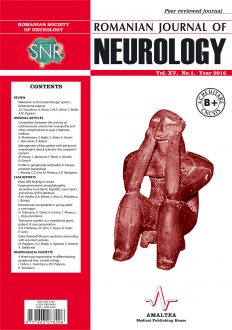SELECT ISSUE

Indexed

| |

|
|
|
| |
|
|
|

|
|
|
|
|
|
| |
|
|
HIGHLIGHTS
National Awards “Science and Research”
NEW! RJN has announced the annually National Award for "Science and Research" for the best scientific articles published throughout the year in the official journal.
Read the Recommendations for the Conduct, Reporting, Editing, and Publication of Scholarly work in Medical Journals.
The published medical research literature is a global public good. Medical journal editors have a social responsibility to promote global health by publishing, whenever possible, research that furthers health worldwide.
TRANSVERSE MYELITIS IN A MYASTHENIA GRAVIS PATIENT. A CASE PRESENTATION
Ruxanda Dana Chirileanu, Mihaela Simu, Cecilia Rosca, Raluca Tudor and Patricia Jurca
ABSTRACT
Myasthenia gravis (MG) is an autoimmune disease caused by the presence of immunoglobulin G (IgG)1 and IgG3 complement activating antibodies against the nicotinic acetylcholine receptor, which affects the neuromuscular junction leading to fluctuating muscle weakness due to impaired neuromuscular transmition. The association of MG and demyelinating diseases is rare, but it has been described before and it could be part of an unspecific immune activation, due to genetic susceptibility or it could just happen randomly. Demyelinating diseases (DD) in MG patients can occur as monophasic events (myelitis, optic neuritis, acute disseminated encephalomyelitis) or recurrent diseases (multiple sclerosis, recurrent transverse myelitis) and since the incidence of DD is higher in MG patients than in general population this association could be part of an autoimune syndrome or genetically induced. We present the case of a 30 year old woman who presented with an unspecific onset of MG and after 5 months was readmitted to our unit with transverse myelitis (with negative aquaporin 4 antibodies) which regressed after 5 days of combined intravenous corticotherapy and immunoglobulin treatment.
Keywords: myastenia gravis, transverse myelitis, aquaporin 4 antibodies, autoimune syndrome
Full text | PDF
